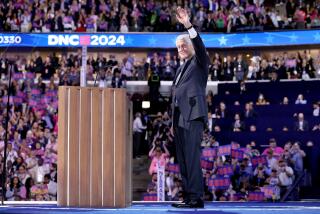Clinton Calls for Giving Students $500 Reward for Volunteer Work
- Share via
STATE COLLEGE, Pa. — President Clinton extolled the virtues of voluntarism on Friday, calling on Americans to join neighborhood watch committees and proposing a $500 federal reward for high school students who perform exceptional volunteer work.
In a commencement address at Penn State University, Clinton returned to his 1992 campaign themes of community and responsibility, saying that government can provide incentives, but citizens must do much of the hard work of reducing crime, cutting welfare dependency and improving local education.
Citing the widespread breakdown of families and communities, Clinton said: “It is clear to me that government alone cannot solve this problem.”
In unveiling his reward proposal, he issued a “challenge” to any school district or civic organization in the country. “If you will raise $500 to reward a high school student who has done significant work to help your community,” Clinton said, “the federal government will match your $500 and help that student go on to college.”
Meanwhile, Clinton’s all-but-certain Republican opponent, Senate Majority Leader Bob Dole, delivered a brief commencement speech at Washington’s Gallaudet University, a federally supported college that is the world’s only four-year liberal arts university for the deaf and hearing impaired.
With polls showing that most Americans know nothing of Dole’s disabling World War II injuries, which left him with a useless right arm and only partial use of his left, Dole’s aides have often urged him to speak more about his wartime experiences and his disability. Some had hoped that Dole would use the Gallaudet speech as a setting to do so.
But Dole passed up the opportunity, shelving a prepared speech that spoke of how he had been tested by his injuries.
“Today is not a day for politics,” Dole told the 380 graduates and their families and friends.
“There’s plenty of time for that in the months to come.”
Instead, Dole said the day was “for celebrating your remarkable achievements,” adding: “It took courage to get to where you are today.”
Dole was introduced by university officials as an unparalleled champion of the disabled and was enthusiastically received by the crowd, most of whom “signed” their approval by waving both hands in the air.
This was the only commencement address on Dole’s calendar, and even though he did not mention his own disability, he took great personal interest in the speaking engagement.
With less than two hours to go before the address, Dole was still in his Senate office searching for appropriate quotations to incorporate into his remarks.
He ended up quoting, among others, his 94-year-old mother-in-law, Mary Hanford, who had urged her daughter, Elizabeth Hanford Dole, as well as others, to strive to “make a difference.”
After the speech, Dole flew to Wilmington, Del., to address a state Republican convention. He was scheduled to fly next to Omaha, Neb., for an event today.
Clinton, in his speech, called for a million citizens to join the 100,000 new police officers funded under the 1994 crime bill in patrolling neighborhoods and combating crime.
He also called for an increase in college work-study programs and asked every secondary school in the country to encourage volunteer efforts by its students.
“I will do all I can to give you the opportunities to make the most of your lives,” Clinton told about 1,000 students receiving advanced degrees. “But you must do all you can to assume responsibility for yourselves, your families and your communities.”
The only concrete proposal in Clinton’s 40-minute speech was the offer to provide $500 “National Service Scholarships” to match community grants to students who perform “extraordinary service.”
Clinton said the government would be willing to recognize up to 20,000 of these students a year, for a total cost of $10 million.
The money would come from the budget of AmeriCorps, the administration’s community service program, and thus would not require congressional approval.
The Penn State speech was the first in a series of commencement addresses this spring designed to tout administration accomplishments and spell out a rationale for the president’s reelection.
The others, at the Coast Guard Academy, Princeton and an unspecified school in California, are to focus on foreign policy, the administration’s economic record and family values.
Speaking to the Penn State crowd, Clinton noted that his wife’s father was a member of the school’s 1936 football team, playing both offense and defense.
“That’s sort of what I do,” Clinton joked.
More to Read
Sign up for Essential California
The most important California stories and recommendations in your inbox every morning.
You may occasionally receive promotional content from the Los Angeles Times.













